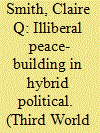| Srl | Item |
| 1 |
ID:
158025


|
|
|
|
|
| Summary/Abstract |
The paper challenges the theoretical and empirical orthodoxy surrounding the debate on international military intervention and mass atrocity endings, via an evidence-based analysis of the situation in East Timor in 1999. By combining existing but under-explored data on mass atrocities with eye-witness accounts, new key informant interviews, and a detailed review of secondary sources, we demonstrate that the wave of militia-perpetrated violence in September 1999 was extinguished prior to the arrival of international military forces. We demonstrate the unique effect of national political factors, when combined with the pressures of international diplomacy, which combined to end mass atrocities in this particular case. We find that the Indonesian regime was not a uniformly recalcitrant regime opposed to ending the atrocities, and demonstrate how factors operating across the national and sub-national levels combined to force the Indonesian leadership to bring the militia perpetrators of this brutal episode of violence under control. Through our new empirical analysis, and the alternative explanation we present to explain endings of mass atrocities in this case, we challenge the tendency to focus on international military intervention as the means by which mass atrocities come to an end.
|
|
|
|
|
|
|
|
|
|
|
|
|
|
|
|
| 2 |
ID:
134411


|
|
|
|
|
| Summary/Abstract |
The paper presents a new interpretation of peace-building in contested transitional states. The peace-building literature is dominated by analysis of international liberal processes and policies, their costs and benefits. To understand non-liberal processes of peace-building, especially those conducted by national governments, new concepts have emerged. The paper employs the concept of ‘hybrid political orders’ to analyse the logic of illiberal peace-building processes in transitional states. In contrast to a normative liberal analysis, this approach interprets violent democratising states as they are, rather than as they ought to be. It also assesses the role that illiberal political institutions, such as those of neo-patrimonialism, can play in reducing violence. In the light of overall government policy and two comparative sub-national cases taken from the Indonesian transition, the paper discusses how illiberal peace-building reduced violence during political transition, and when and why it failed. The discussion has relevance for wider understanding of the comparative politics of democratisation and peace-building in contested states.
|
|
|
|
|
|
|
|
|
|
|
|
|
|
|
|